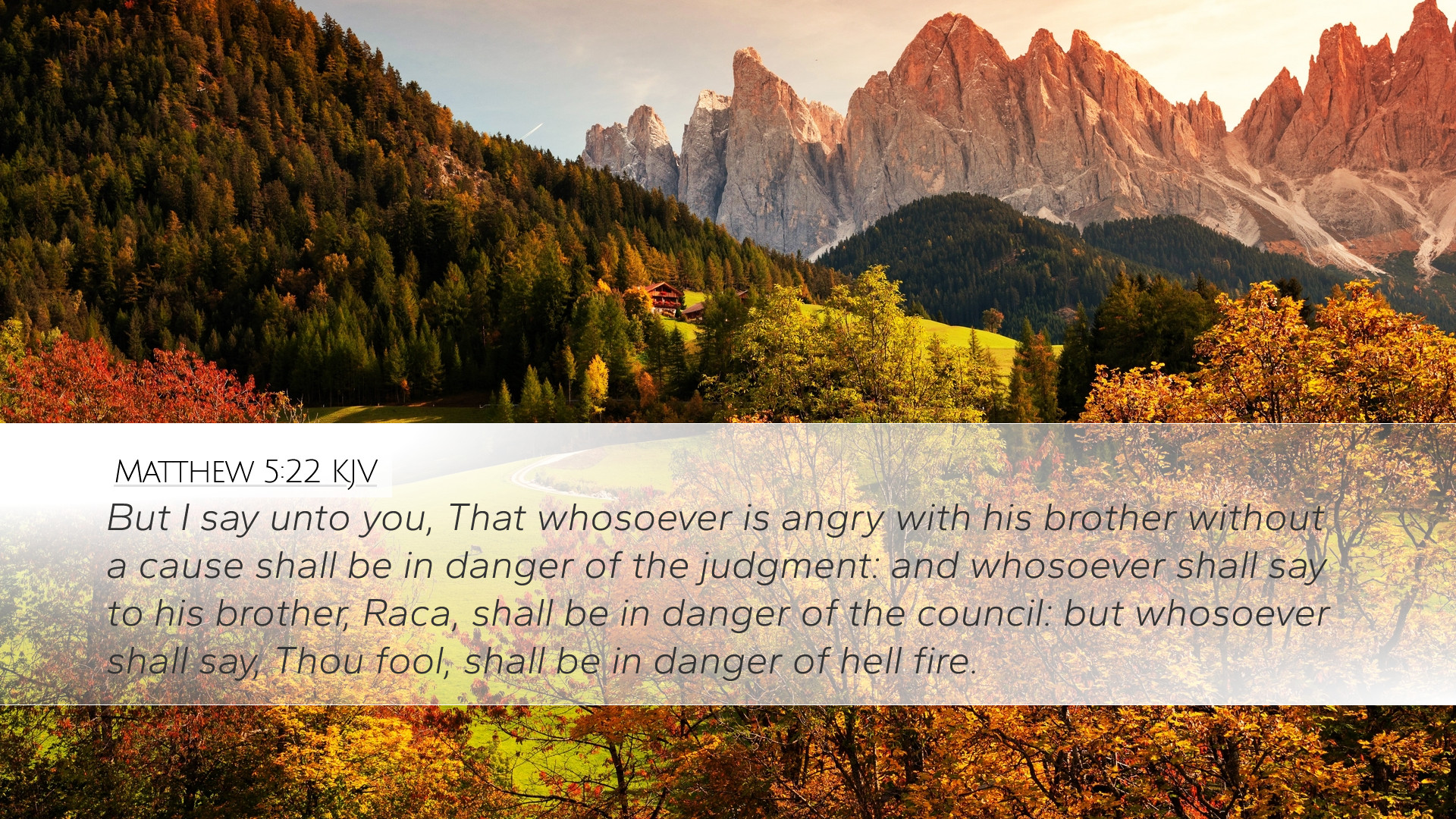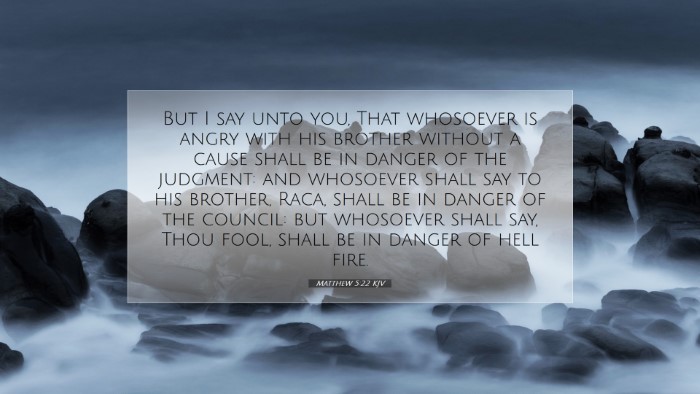Commentary on Matthew 5:22
Verse Text: "But I say unto you, That whosoever is angry with his brother without a cause shall be in danger of the judgment: and whosoever shall say to his brother, Raca, shall be in danger of the council: but whosoever shall say, Thou fool, shall be in danger of hell fire."
Introduction
This verse is part of Jesus' Sermon on the Mount, where He articulates the deeper implications of the Law. Matthew 5:22 reveals the heart condition behind actions and extends righteousness beyond mere external compliance to the inner self. In this commentary, insights from Matthew Henry, Albert Barnes, and Adam Clarke will converge to illuminate the thematic richness and theological significance of this scripture.
Exegesis and Analysis
1. The Prohibition of Anger
Henry's Insight: Matthew Henry emphasizes that Jesus begins this teaching by elevating the moral law from the literal to the spiritual. Anger, in this context, is a serious moral issue. He insists that unchecked anger can lead to a breach of community, inferring that such anger is akin to murder in the heart (cf. 1 John 3:15).
Barnes' Perspective: Albert Barnes highlights the phrase “without a cause,” suggesting that while not all anger is sinful, it requires discernment. Anger may be righteous (e.g., Jesus in the temple), but here, the anger that has no legitimate cause is warned against, exposing the danger of resentment and malice in interpersonal relationships.
Clarke's Commentary: Adam Clarke notes that the term "brother" implies a relational context, thus deepening the moral obligation we have towards those within our community. The anger against another, especially a fellow believer, reflects a deficiency in love and understanding of God’s grace.
2. The Danger of Belittling Remarks
Henry's Viewpoint: Henry describes "Raca," an expression of contempt, as an affront to one's character that threatens communal harmony. Such disrespect not only injures the individual but also jeopardizes the integrity of the community as a whole. This indicates the grave nature of trivializing others' worth.
Barnes' Interpretation: Barnes stresses that "Raca" means "empty one" and conveys significant disdain. Jesus suggests that belittling others puts one in danger of judgment, calling into question the very nature of our speech and its reflective state of the heart.
Clarke's Analysis: Clarke expounds that such remarks betray an absence of love and proper character evaluation in a brother. He mentions that to diminish someone's value is to belittle the Creator who made them, and thus one risks judgment from the higher authorities, a spiritual consequence of the sin of contempt.
3. The Consequences of Calling Someone a Fool
Insights from Henry: Calling someone a "fool" denotes an aggressive finality in judgment, revealing not just discontent but a full rejection of the person's worth. Henry articulates that labeling someone in this manner shows a heart filled with scorn, which is perilous, leading to "hell fire"—a metaphor for severe judgment.
Barnes' Explanation: Albert Barnes notes that the term "fool" indicates a more serious disdain. It reflects a spiritual arrogance that dismisses another's dignity and standing before God. Such attitudes can lead to hellish consequences, warning us of the seriousness of derogatory language.
Clarke's Contribution: Clarke reinforces the notion that to call someone a fool evil is not simply a minor insult; it has spiritual implications. This kind of verbal judgment disregards God’s grace shown to others, placing one in severe risk. The warning becomes more profound as it indicates a straightforward pathway that leads away from God's kingdom.
The Ethical Implications for Believers
Understanding Matthew 5:22 compels believers to engage in self-examination regarding their treatment of others. The teaching challenges believers to confront their attitudes, urging them to respond to anger and judgment with grace, thus reflecting the character of Christ.
- Recognition of Inner Attitudes: The command clarifies that internal emotions matter to God, as they can manifest in actions.
- Relationship with Others: This verse highlights that one's relationship with God is tied directly to relationships with others. Anger disrupts harmony and integrity within the body of Christ.
- The Necessity of Righteous Speech: Believers are urged to speak life and encouragement, embodying a witness of Christ’s love and compassion.
Conclusion
Matthew 5:22 serves as a powerful reminder of the call to a deeper righteousness that transcends mere legalistic adherence to commandments. Through the synthesis of insights from Henry, Barnes, and Clarke, it becomes evident that the heart's posture towards others is paramount in the eyes of God. Pastors, students, theologians, and scholars are encouraged to reflect on their inner motivations, attitudes, and the words they project into their communities.
In a world fraught with anger and division, this scripture becomes a vital text in urging believers towards reconciliation, love, and the immeasurable grace that God extends to all. The gospel's transformative nature calls for a life characterized not only by what one refrains from doing but also by what one actively pursues—namely, the promotion of peace and mutual respect.


